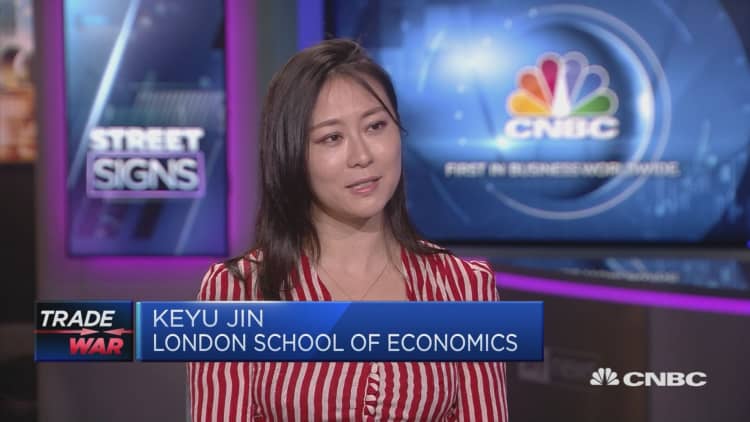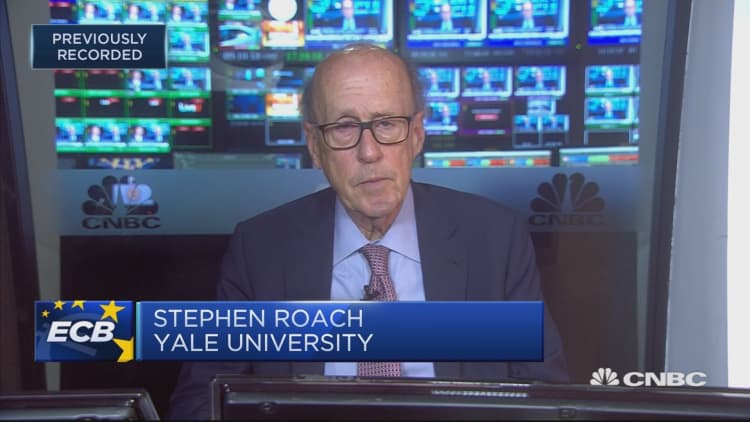As investors await further developments in U.S.-China trade deal, an economics expert told CNBC Wednesday that the signing of a phase one trade deal between won't be a real victory for either side.
Speaking to CNBC's "Street Signs Europe," Keyu Jin, associate professor of economics at London School of Economics, described the phase one agreement as a "face deal" that would allow both sides to say they've made some progress.
"It's kind of a big gift for President Trump because we've seen the stock markets really," she said. "But the phase one deal's really about the resolvable negotiable stuff in the first place — the more difficult non-negotiable items are put back, delayed, and we don't really know what's going to come out of that. So unless old tariffs can be rolled back for China it can't really be seen as a victory for them, or much for the U.S. because the more intractable problems are still there."

She added that even some of the more difficult issues that had been negotiated in the deal — like those surrounding intellectual property and the opening up of Chinese markets — didn't mark a huge breakthrough.
"That's what the Chinese want to do anyway, it's consistent with their longer-term goals," Jin explained. "There's so much of a focus on technology and innovation these days coming from the government, coming from the private sector, (intellectual property) protection is absolutely critical."
According to Jin, however, even if China agrees to make concessions around certain laws or regulations, it may still take a while for tangible change to be delivered.
"There's a difference between what's written in the law and actual enforcement. Lots of things are written in the law, the legal system is quite comprehensive, the patent protection mechanism is there, it's really about enforcement," she said.
"Enforcement is tricky because it involves a lot of local government, local private firms, that the central government doesn't have a complete control over. They are taking substantive steps to make sure that enforcement will also take place, but that will take time," Jin added.
"If we're talking about wanting the Chinese to change their developed model, reducing the state influence, I think that's more of a no-go area. And by the way, it's a false dichotomy to separate the state and the private — they are collaborating, merging, working together on all fronts and that is not going to change."
Investors around the world have been eagerly awaiting the signing of a trade agreement since Trump said in October that the U.S. had come to a "very substantial phase one deal" with China.
While markets have experienced volatility on the back of news related to the deal, sentiment has been lifted in recent days. Trump said Tuesday that the U.S. and China were in the "final throes" of negotiations, while China's Ministry of Commerce said in a statement that both sides had discussed "resolving core issues" on Tuesday.
Some analysts weighing in on the phase one deal have agreed with Jin that the signing of the deal would largely be a political win.

Speaking to CNBC's "Street Signs Europe" on Friday, Stephen Roach, senior lecturer at Yale University's Jackson Institute, slammed the deal as "hollow" and "flawed," adding that it was "politically expedient" and would fail to address the structural issues that sparked the trade conflict.
"China has politics the same as the U.S. has politics," Steve Okun, senior advisor at consultancy McLarty Associates, told CNBC's "Street Signs Asia" on Wednesday. "Xi has to worry about his internal politics, he has to worry about his standing within the party."
Lu Yu of Allianz Global Investors also told CNBC recently that the phase one deal would not be a significant breakthrough in the conflict, describing it as simply a "pause" in the trade war, while former Treasury Secretary Larry Summers told CNBC earlier this month the deal would not mark the beginning of "some kind of economic nirvana."
Others, however, have been more optimistic on the economic implications of a preliminary deal being finalized.
King Lip of Baker Avenue Asset Management told CNBC he was optimistic the phase one deal would be "a positive for both sides" economically.

